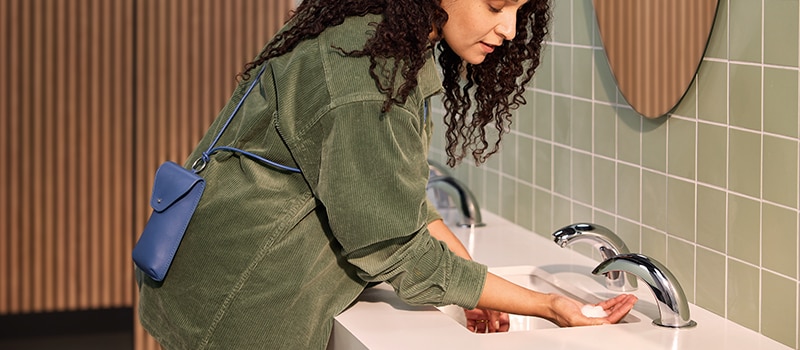
Guests avoid restaurants with poor restrooms, says new Tork survey data
2025-04-01
73% of people say a bad restaurant restroom experience will impact their willingness to return1
Global survey data from Tork, an Essity brand and the global leading professional hygiene brand, shows that the restroom experience is critical for guests. Nearly 50% of individuals surveyed keep track of public locations – including businesses – where they’ve had a poor restroom experience to avoid those locations in the future. That number jumps to 73% for restaurant or café patrons who say their decision to return is impacted by a poor restroom experience.
“When consumers are out to dine – whether it’s a quick meal or fine dining – the restroom serves an important function,” said Dotti Haynes, HoReCa Marketing Director, Professional Hygiene at Essity. “It’s often seen as a reflection of other ‘behind the scenes’ areas, such as the kitchen, where proper hygiene is critical to food safety. Businesses shouldn’t underestimate the perception created by poorly kept or poorly equipped restrooms – the restroom truly matters more than they might think.”
For restaurant guests, access, automation and cleanliness in the restroom matter significantly for a positive and comfortable experience. Guests indicate the most important criteria include: paper towels to dry hands (81% listed these as important, versus 65% who said jet air dryers are important); automated soap dispensers (78% listed these as important); bins for incontinence products (74%); automated faucets (73%); automated toilet flushers (72%) and signs reminding visitors to wash their hands (68%).
The survey data shows a disparity between business owners’ hygiene perceptions and the reality of the guest experience:
- Almost all businesses surveyed (92%) say it’s important that their restrooms are hygienic. However, 57% of people think public restrooms feel unhygienic.
- 93% of restaurant managers think it is important to ensure that the restroom meets the needs of as many patrons as possible, providing more inclusive hygiene
- Yet, less than half of the same respondents say they offer key elements of inclusive restroom design including soap dispensers and sinks that are reachable for all, gentle soap, sanitation bins, changing stations or quiet dispensers.
Inclusive hygiene helps businesses provide better and more comfortable restroom experiences for restroom users, regardless of their health conditions, physical capabilities, stage of life or hygiene concerns. Tork is raising awareness around inclusive hygiene in public restrooms, working to educate businesses on why and how to provide more inclusive hygiene solutions for both employees and customers.
“In restaurant, café and hospitality settings, employees and managers are juggling many priorities with the ultimate goal to deliver a positive full house experience,” Haynes continued. “Businesses should think about the restroom with consideration to the diverse abilities and needs of their guests. These include mobility changes that could come with age or skin sensitivities such as eczema, which can be irritated by harsh soaps. There are also a range of neurodiverse and cognitive needs. For example, many people are sensitive to loud noises, so hand dryers may be triggering and many are impacted by overall hygiene concerns in the restroom.”
Tork recommends these practical steps to create more inclusive hygiene in the restroom for staff and guests:
- Aim for a quiet environment, avoiding sensory overloads.
- Install high-capacity dispensers to maximize product availability.
- Ensure restrooms are kept clean at all times.
- Install paper towel, toilet paper and soap dispensers that are easy to use for people with reduced hand strength.
- Use soap products that are kind to skin and dermatologically tested.
- Install dispensers that control consumption, to help reduce waste and increase hygiene with one-at-a-time dispensing.
To learn more about how restaurants can create a better guest experience through better hygiene, please visit: www.torkglobal.com/us/en/for-your-business/industry/foodservice.
1 Tork Insight Survey 2024, conducted in US, UK, Germany, France and Mexico among 6000 end-users and 900 end-customers.
For additional information please contact:
FHTork@fleishman.com
About Tork
The Tork brand offers professional hygiene products and services to customers worldwide, ranging from restaurants and healthcare facilities to offices, schools and industries. Our products include dispensers, paper towels, toilet tissue, soap, hand sanitizers, napkins, wipers, but also software solutions for data-driven cleaning. Through expertise in hygiene, functional design and sustainability, Tork has become a market leader that empowers customers to think ahead and improve business outcomes through sustainable hygiene management. Tork is a global brand of Essity, and a committed partner to customers in over 110 countries. To keep up with the latest Tork news and innovations, please visit www.torkglobal.com/us/en
About Essity
Essity is a global, leading hygiene and health company. Every day, our products, solutions and services are used by a billion people around the world. Our purpose is to break barriers to well-being for the benefit of consumers, patients, caregivers, customers and society. Sales are conducted in approximately 150 countries under the leading global brands TENA and Tork, and other strong brands such as Actimove, Cutimed, JOBST, Knix, Leukoplast, Libero, Libresse, Lotus, Modibodi, Nosotras, Saba, Tempo, TOM Organic and Zewa. In 2024, Essity had net sales of approximately SEK 146bn (EUR 13bn) and employed 36,000 people. The company’s headquarters is located in Stockholm, Sweden and Essity is listed on Nasdaq Stockholm. More information at www.essity.com.